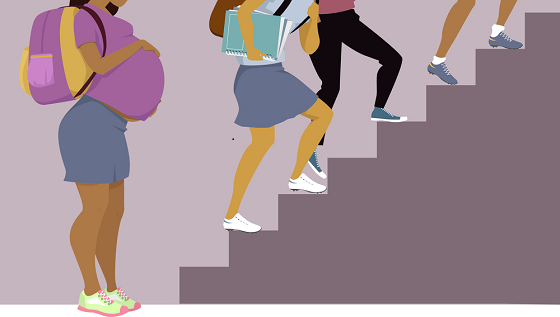
4 Main challenges faced by teen mothers
The demands of parenthood are hard on adults and harder on teens.
Often, the teen mothers are left to carry the burden of parenthood alone while the father either continues school, refuses to take responsibility, or remains unknown.
Teen motherhood comes with its challenges. These include;
Lose opportunity to advance education
Girls lose their childhood and are forced to drop their education to adapt to the life of caring for their children. In Kenya, 98% of teen mothers are out of school with a zero probability of returning. Having no access to education means chances of having a successful life are limited. For those who return to school, these institutions fail to offer a safe space for teen mothers and fail to offer psychological support.
Stigma and rejection
Teen mothers face stigma from their parents, teachers, peers, and society. This has made it difficult for teen moms to seek social and moral support and at times, many are disowned by their parents or kicked out of home. This leaves them more vulnerable to abuse and exploitation in the community.
Poverty
Teen mothers suffer from poverty. They resort to transactional sex or endure gender violence and abuse in exchange for material goods, food, or money. Many of these young girls are younger than the fathers of their babies thus a huge power imbalance making it difficult for poor teenage mothers to defend and protect themselves from abusers. Some end up opting for early marriages as a way of accessing food, clothing, housing, and security.
Mental health problems
Several factors can negatively affect teen mothers’ mental health. These include lack of sufficient sleep, lack of family support especially in cases where pregnant teens are kicked out of parents’/guardians’ homes, change in social status, loss of friends, the cost of raising a child, and the hustle of juggling school while raising a child. These, and others, can lead to mental health problems including stress and depression.
Can you help?
Yes.
Teen motherhood is a huge transition from childhood where she goes through the experience of growing as a child and starts taking care of her baby. Her mental wellness and experiences can also affect the experiences of their own children, i.e. low academic advancement, poor social behavior, and low self-control and esteem.
Teen mothers should have the opportunity to fully enjoy their sexual and reproductive rights and access to education, through the implementation of already existing policies including the Return to School Policy (2020).
Local gatekeepers and opinion leaders should ensure the society does not perpetuate stigma but promotes a conducive and comfortable environment for teen mothers.
When a teenager becomes a mother, parents and guardians should help. In addition to helping the teen mothers finish school, they need to have open and honest sexuality talks with adolescents especially during puberty educating them on sexual choices, and sexual violence. They need better education and access to contraception to prevent unwanted pregnancies. Also, they should help teens and guide them through motherhood.
There’s a need to addressing poverty as an underlying cause of teen pregnancy and motherhood through accelerating values and attitudes on safe sex conversations involving men and boys to be at the forefront of protecting girls from sexual exploitation.
